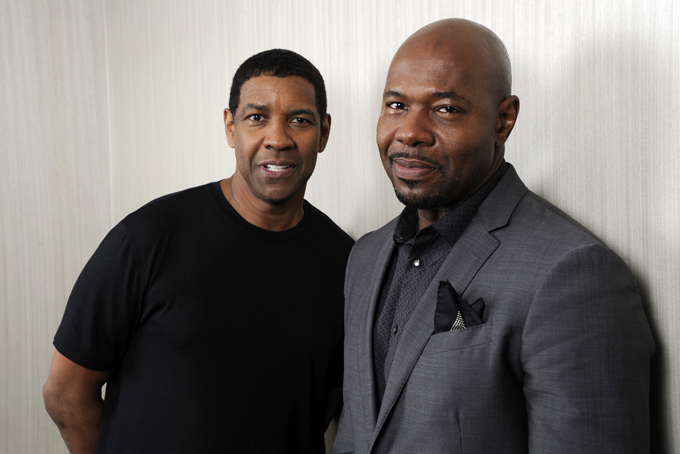
TORONTO (AP) — It’s been a dozen years since Denzel Washington and director Antoine Fuqua rode the corrupt Det. Alonzo Harris and their Los Angeles crime odyssey “Training Day” to Oscar glory (for Washington) and a Hollywood breakthrough (for Fuqua).
“You look up, I didn’t realize it was 12 years,” says Washington. “That’s quick. That’s too fast.”
In “The Equalizer,” a very loose adaptation of the 1980s private eye TV series, Washington and Fuqua have finally reteamed, resuming a potent actor-director tandem. The film, which opens Sept. 26, has also kick-started further collaborations. They are planning a “Magnificent Seven” remake (“You don’t get many shots at a Western,” says Washington, grinning) and could return for a potential sequel to “The Equalizer.”
You might expect the two to have an easygoing congeniality together, ready to expound on the success of their partnership. You would be wrong.
“You don’t overthink it,” says Washington, who is not prone to brooding or rumination. “You just do. It does, so do.”
In ‘The Equalizer,” Washington plays a bald widower living a Spartan life in Boston. He works at a hardware store and every night fastidiously drinks his tea at a local diner. But when a diner acquaintance (a prostitute played by Chloe Grace Moretz) gets involved with the Russian mafia, his proficiency with violence (not unlike it often is with Liam Neeson) is reawakened.
Washington’s intensity, perhaps as it would be in any pairing with the veteran actor, is the dominate force between him and his director. Asked what appeals to Fuqua about working with Washington, the actor chuckles: “You want me to leave the room?”
“You work with somebody who’s always challenging you and himself, and just wants you to be the best,” answers Fuqua, whose credits since “Training Day” include the White House action flick “Olympus Has Fallen,” the vigilante thriller “Shooter” and the period adventure “King Arthur.” ”Even if it’s challenging, that’s what brings the best out of you.”
It’s that pressurized tension that seems to most fuel Washington and Fuqua. They are, tellingly, both amateur boxers and share the same trainer. Greeted on a recent morning at the Toronto Film Festival where “The Equalizer” premiered, they were eagerly discussing the previous night’s fight. Boxing metaphors peppered their conversation.
“You go into the ring, you’re going in to get it in,” says Fuqua, whose next film is a boxing drama, “Southpaw,” starring Jake Gyllenhaal. “It’s the same thing with making a movie. You’re going in there to put the work in, do something with some intensity — a little grit.”
Washington, then, is like a prizefighter emerging from his trailer, ready to spar.
“You say you’re ready, then I’m coming out and here we go,” says Washington of his mindset going into a scene. “Walk in the ring and start throwing punches.”
Washington and Fuqua had been set to reunite once before in “American Gangster,” the saga about the Harlem drug dealer and smuggler Frank Lucas. But Universal Studios fired Fuqua weeks before the movie was to begin shooting and, days later, the film was canceled altogether. The project was eventually rekindled with Ridley Scott directing.
But Fuqua and Washington continued to look to team up. Washington called Fuqua about helming “The Equalizer,” and the director later approached Washington about “The Magnificent Seven.” (The basis of the Western, Kurosawa’s “Seven Samurai,” Fuqua says, is what inspired him to be a filmmaker.)
Their work together is predicated on leaving the other enough room to operate in.
“I’m not looking over his shoulder,” says Washington. “We collaborate all the time but we spend a lot more time in the preparation phase. Once we start shooting, he’s got stuff to do, and if I’m not doing what I need to do on a set, I’m off the set. I’m in my trailer.”
Washington says he needs his own space to focus, to hold on to his character. He’s there to work, not make friends: “Nobody ever said ‘Man, he sucked (in the movie), but I bet he was nice to everybody on set,'” he says.
Though he looks nearly two decades younger, Washington will turn 60 this December. But it’s now clear that his movies with Fuqua will be a definite — if once interrupted — chapter in his career.
“I’ve worked with Jonathan Demme twice, Ed Zwick three times, Spike (Lee), I think, four times and (the late) Tony Scott five times,” says Washington. “There are people I’m comfortable with that know what they’re doing. So it makes my job easier. It’s a good collaboration and we’ve had good results.”
___
Follow AP Film Writer Jake Coyle on Twitter at: https://twitter.com/jakecoyleAP